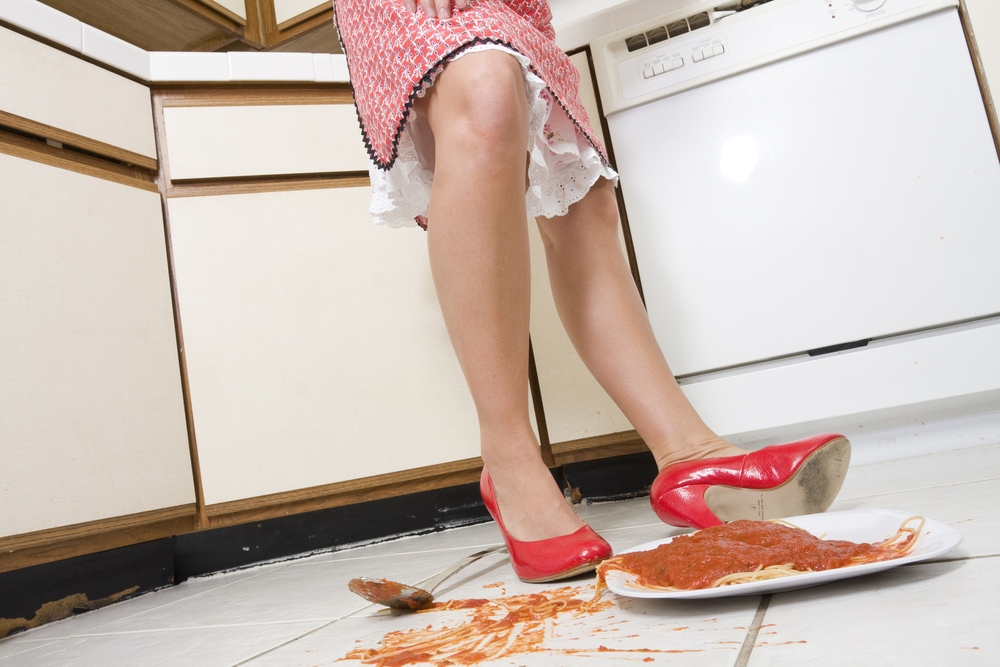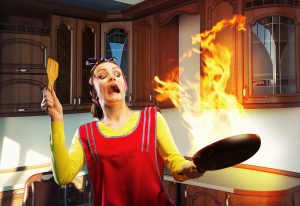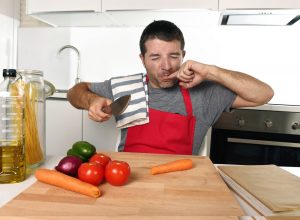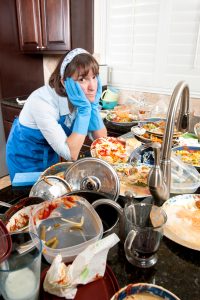Not to be the bearer of bad news, but your kitchen is a land mind of disaster. Two thirds of home fires start in the kitchen, 480 people die a year in kitchen fires, and 350,000 people are injured by kitchen knives each year. The most common injuries are burns, fires and lacerations. With these resourceful tips, you will have a safe and hopefully, delicious holiday in and out of the kitchen.
Fires
- Always stay in the kitchen while cooking.
- Keep a fire extinguisher close by (with a minimum of 5-B.C).
- Make sure your smoke alarm is in working order.
- Keep anything that could be a potential fire hazard away from stove tops (i.e. oven mitts, paper towels, dish rags, etc).
- Use a lid, baking soda, or salt to smother grease fires. Never throw water on it.
- If the fire gets out of hand, leave the kitchen immediately and dial 911. Your life is more valuable than your kitchen.
- Prevent a fire by tying loose hair back and by not wearing dangling clothes or jewelry.
 Burns
Burns
- The steam from microwaves can burn just as well as stove tops and ovens. Lift lids away from your face so that you are not scalded.
- Use an oven mitt to remove items from the microwave.
- Microwaves can heat unevenly. Be sure to stir properly and test food to prevent incinerating your mouth. Let cool before tasting.
- Always boil water on the stove and never in a microwave. The boiling over effect is not fun.
- When opening the oven, stand to the side to prevent burns.
- If your microwave catches fire, unplug it immediately and leave the door shut.
- Keep tongs and utensils nearby for easy access. Don’t use your fingers to test food.
- Don’t cook while holding children.
- Be sure to turn pots and pan handles facing inward on the stove so they do not get knocked over.
- If you are burned, do not ice the skin or use cold water on it. Instead, place the injured skin under cool water for 10-15 minutes until the pain recedes. If skin is removed, see an ER as it could be a serious injury.
- 63% of stove fires occur from frying. Be cautious when frying items. Let the heat rise slowly to prevent pops and burns.
- Let grease and cooking oil cool before removing it.
- Create a clear path when straining pastas from boiling water.
- Water can heat rapidly. Remain cautious when using the kitchen faucet.
Lacerations
- Use the correct tool for the job (i.e. don’t use a knife to open a can).
- Never cut food in your hand. Use a cutting board. That’s what they are for.
- Don’t attempt to catch a knife when it falls. Let it drop.
- Carrying a knife while carrying other items is a no-no.
- Keep shears and knives facing downward if you place them in the dishwasher.
- Don’t place sharp utensils such as knives in a murky sink. Leave them visible to prevent cuts.
- Use caution when opening canned items. Place the lid inside the can once emptied to prevent cuts.
- Use utensil dividers to keep your hands from getting sliced on a potato peeler.
- Dull knives are more dangerous than sharp ones. Keep your knives sharp. The easier they cut, the less force you use.
- Always cut away from your body.
- Stash kitchen knives in a block when you aren’t using them so they do not tilt over.
- Prevent disasters by placing a towel under your cutting board. Use cutting boards with a raised surface as opposed to a slippery one.
- Never put your hand in a blender. Most blenders are washer safe and you don’t want to be maimed.
Most kitchen accidents can be avoided by organization. Trust me, de-clutter. You can thank me for it later.
- Prevent distractions. Keep the dog (or cat) out of the kitchen, remove pesky throw rugs, don’t use the telephone while cooking, and keep your children away.
- Clean up kitchen spills as they happen. You don’t want to slip on it later.
- Use step stools.
- Close cabinets to avoid shin pain.
- Store heavy pots and pans on lower level shelves.
- Clean out your refrigerator often. Clutter can lead to items falling and breaking such as mason jars.
- A clean counter top makes cooking easier.
- Lay out the items you will use in advance so that you don’t have to stop and search for them when your roast is scorching.
- Label items for easy use.
- Keep a First Aid kit handy with band-aids, antibiotic ointment, aloe vera, alcohol, hydrogen peroxide, and anti-inflammatories because that is what kitchen masters do.
Cookware
- Never remove an item from the refrigerator and place it directly in the oven. This can cause the glass to break and vice versa.
- When placing cookware in the sink, don’t cool the glass in cold water.
- Stop using chipped or cracked cookware. No one wants to get cut.
Sanitation
- Place foods with juices on the bottom shelf of the refrigerator until you are ready to cook them.
- Cook or freeze meats within two days.
- Replace dish rags at least once a week and let them dry between use.
- Cook meats at the correct temperature before consuming them.
- Easily disinfect your sponges by wetting and heating them in the microwave for two minutes.
- Clean your kitchen counters, utensils, and cutting boards using one gallon of bleach and one gallon of water (because the fact that the average cutting board has 200% more fecal bacteria than a toilet seat is disconcerting).
Now go and cook your masterpiece accident free!

